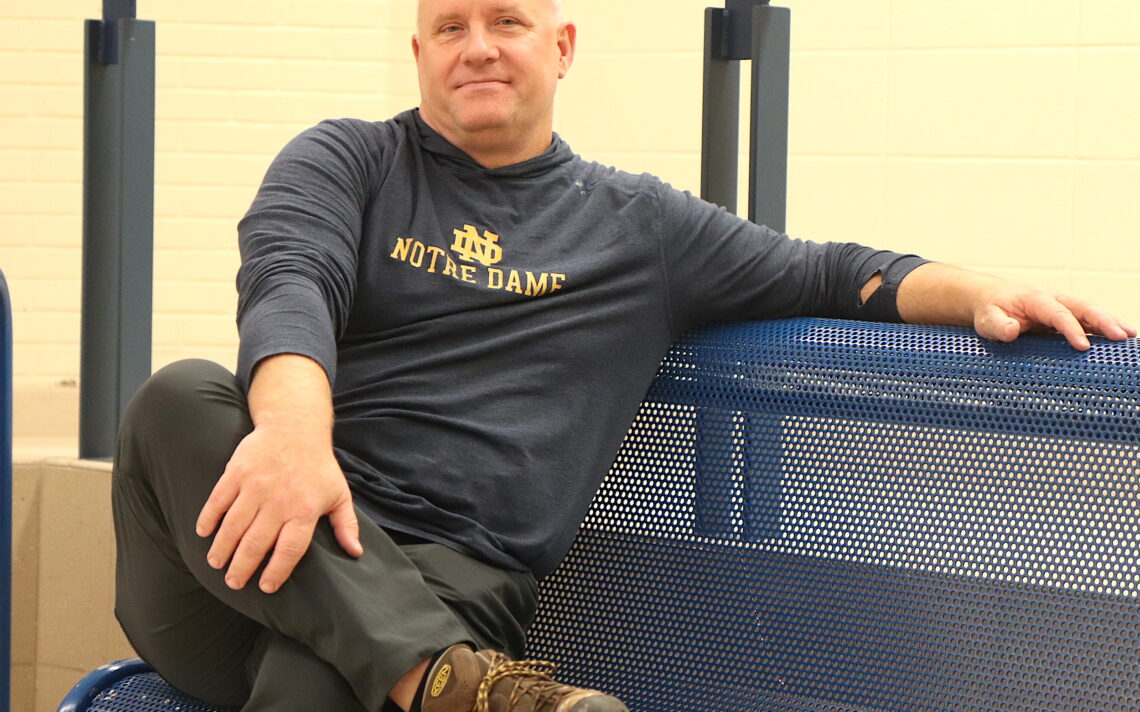
Walker no longer answering the bell
A familiar face was helping out at last week’s Ontario Catholic Classic Basketball Tournament.
Recently retired from Holy Cross where he had a long and successful coaching and teaching career, Dave Walker was pitching in where he could.
“John Giroux is a good friend of mine and we both retired at the same time. He told if I wasn’t doing anything that I should come out and help out. I am basically handing out Gatorade to the teams after the fact but it is fun to see all the people who we haven’t seen in a long time.”
The 57-year-old Welland native is still adjusting to being retired.
“Everybody I talked to said to take a year and get your feet under you and figure out what you want to do,” the Welland Notre Dame alumnus said. “I’ve never had more job offers in my life.”
He has been able to go on longer trips to watch football and basketball at Notre Dame, there’s plenty of golf games with Giroux and time to travel, such as visiting with his daughter, Emily, who runs a bakery on Main Island off of Victoria, B.C.
“She was the first one to try and employ me. She said she needed someone to come out and run the ice cream stand.”
Wherever his day takes him, he is content.
“I am enjoying not having to answer to a bell.”
After attending Notre Dame, where he played hockey, baseball, football, volleyball, Walker obtained a kinesiology degree from the University of Waterloo and a Masters of Education degree at Canisius.
He started teaching at Lakeshore Catholic and coached junior football for the Gators. He then taught adult education for a year and then ended up at Holy Cross, where he taught and coached from 1995 until 2022.
“That was a long run and a good run. Usually you get moved around but I got lucky enough to get moved into a position where they let me stay,” said the member of the Welland Rowdies midget baseball team, which won a Canadian title in 1983.
At Holy Cross he coached girls volleyball, junior girls basketball, lacrosse, boys hockey, junior football and golf.
“As the coaching ranks started to get depleted, you ended up coaching everything,” he said.
Highlights included an Ontario Federation of School Athletic Associations bronze medal in hockey in 2015 and 14 medals at the OFSAA field lacrosse festival.
“Mike Sheehan started it [field lacrosse) before I got there and I helped him for a year before he went to the board office. That was right about the time that lacrosse was really getting going in high school so I had an opportunity to really run with it,” he said. “That was really nice because we were really the only lacrosse program in the north end. It fed to my school and if you want to have great teams, get great players.”
Being dedicated also helped.
“I firmly believe if you are going to do it, you put everything into it that you’ve got. Don’t do it halfway. We travelled to different events and I took my guys down to the States all the time just to get better lacrosse. You get a reputation for being a program worth going to and it grows from there.”
Corey Quinn has asked him to help out with the lacrosse team this spring but he has yet to decide.
Coaching was a labour of love for Walker.
“It allows you to have a level of interaction with the students that you don’t get in the classroom. It was a little bit closer for teaching values because I found sports is the best way to teach values to kids: Hard work; determination, making good decisions; and, being respectful. While the classroom is good for that, the sports field is better because you get bad calls, you get games that you lose that you shouldn’t have, games that you win that you shouldn’t have. All of those things when they come together, you are learning every day. I really loved that about coaching and the kids kept me young.”
His coaching was guiding by two overriding principles.
“The big thing was to do it the Holy Cross way,” he said. “The Holy Cross way was respectful, don’t talk to the refs and if we have a problem we [coaches) deal with it. It was basically do it the right way all the time. A lot of events that we went to we would get compliments about how well-behaved our players were.”
The second core philosophy was ‘meat and potatoes.’
“Don’t make a pass behind the back when you can shoot the ball, no Michigans, go hard, do what you are supposed to do, play your position and no one else’s position and be responsible for yourself. Players try to get outside themselves and do everyone else’s job. If you do your job and don’t complain about anyone else, things will be good.”
Walker is concerned about the future of high school sports.
“I don’t think it is in really good spot,” he said. “We are a British model trying to be American. The British model is founded on volunteerism. The American model is not founded on volunteerism but because we live right next door to them we are doing a volunteer model but trying to do it the American way. But the Americans have a couple of advantages. They pay their coaches which adds a level of responsibility to showing up and when their high school sport is in season, the kids are playing high school sports. They are not playing another sport.”


























